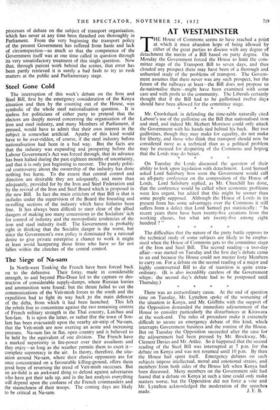AT WESTMINSTER
THE House of Commons seems to have reached a point at which it must abandon hope of being allowed by either of the great parties to discuss with any degree of detachment the merits of a Bill based on party dogma. On Monday the Government forced the House to limit the com- mittee stage of the Transport Bill to seven days, and thus clouded any prospect there may have been of a thorough and unhurried study of the problems of transport. The Govern- ment assumes that there never was any such prospect, but the future of the railways at least—the Bill does not propose to de-nationalise them—might have been examined with some care and with profit to the community. The Liberals certainly thought that if the Bill had to be guillotined twelve days should have been allowed for the committee stage. * * * * Mr. Crookshank in defending the time-table naturally cited Labour's use of the guillotine on the Bill that nationalised iron and steel, and indeed Mr. Herbert Morrison could only attack the Government with his hands tied behind his back. But two guillotines, though they may make for equality, do not make for liberty, and those who think that transport should now be considered more as a technical than as a political problem may be excused for despairing of the Commons and hoping that the Lords may do better. * * * * On Tuesday the Lords discussed the question of their ability to look upon legislation with detachment. Lord Samuel asked Lord Salisbury how soon the Government would call an all-party conference on the composition of the House of Lords. Lord Salisbury replied, as Mr. Churchill has done, that the conference would be called when economic problems were less urgent, but added that this might be sooner than some people supposed. Although the House of Lords in its present form has some advantages over the Commons it still suffers from a defect that Lord Samuel put statistically : "In recent years there have been twenty-five creations from the working classes, but what ate twenty-five among eight hundred ? " * * * * The difficulties that the nature of the party battle opposes to the technical study of some subjects are likely to be empha- sised when the House of Commons gets to the committee stage of the Iron and Steel Bill. The second reading—a two-day affair—was started on Tuesday and the first day's debate came to an end because the House could not muster forty Members to carry on. For a debate on the second reading of a major and highly controversial Bill to die of inanition is quite extra- ordinary. (It is also incredibly careless of the Government whips: the second day's debate had to be postponed until Thursday.) * * * * There was an extraordinary cause. At the end of question time on Tuesday, Mr. Lyttelton spoke of the worsening of the situation in Kenya, and Mr. Griffiths with the support of the Opposition demanded the immediate adjournment of the House to consider .particularly the disturbances at Kirawara at the week-end. The rules of procedure make it extremely difficult to secure an emergency debate of this kind, which interrupts Government business and the routine of the House. But on Tuesday the Opposition succeeded after the case for the adjournment had been pressed by Mr. Brockway, Mr. Clement Davies and Mr. Attlee. So it happened that the second reading of the Steel Bill was interrupted at 7 p.m. for the debate on Kenya and was not resumed until 10 p.m. By then the House had spent itself. Emergency debates on such subjects impose intellectual, moral and emotional strains, and members from both sides of the House left when Kenya had been discussed. Many members on the Government side had feared that a debate on Kenya 'at such a time could only make matters worse, but the Opposition did not force a vote and Mr. Lyttelton acknowledged the moderation of the speeches


































 Previous page
Previous page